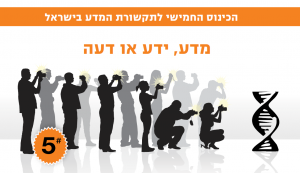The Israeli Science Communication Events
In an effort to foster the Israeli science communication community, our group has co-organized a series of events, including conferences, public lectures, and round table discussions. These events bring together science communicators, scientists, media researchers, journalists, editors, spokespeople, formal and informal science educators, and others who care about science communication.
- A Science Communication Training Workshop for Outstanding Ph.D. Students, conducted under the auspices of the Israel Young Academy, Haifa, June 30-July 1, 2019
- A public lecture by Prof. Lord Robert Winston, Haifa, May 14, 2019
- A Science Communication Training Workshop for Outstanding Ph.D. Students, conducted under the auspices of the Israel Young Academy, Haifa, May 30-31, 2018
- Pass it Forward, a meeting of online communicators of academic knowledge under the auspices of the Israel Young Academy, Rehovot, April 26, 2018
- A public lecture by Alan Alda and training workshops of the Alan Alda Center for Communicating Science, Haifa, February 2018
- The Second Connecting People with Science Conference, Rehovot, December 17, 2017 (Coverage; Video and Photos)
- Public Engagement with Science Online (PESO) 2017, a research workshop of the Israel Science Foundation, Haifa, June 25-28, 2017
- The Connecting People with Science Conference, Rehovot, June 30, 2016 (Photos)
- The Sixth Israeli Science Communication Conference, Rehovot, June 24-25, 2015
- The Fifth Israeli Science Communication Conference, Tel Aviv, November 3-4, 2013
-
The Fourth Israeli Science Communication Conference, Haifa, June 5-6, 2012
-
The Third Israeli Science Communication Conference, Jerusalem, June 16, 2011 (Videos)
-
The Second Israeli Science Communication Conference, Jerusalem, December 24, 2009 (Videos)
- The First Israeli Science Communication Conference, Haifa, March 16, 2009
Join the Community!
You are welcome to join the Israeli Science Communication community. (Discussions are conducted mostly in Hebrew.)
- Join our Facebook group: תקשורת המדע
- Subscribe to our mailing list by e-mailing 6thscicomm@gmail.com
Science Communication Takes Center Stage
Scientists and decision makers worldwide are increasingly recognizing the importance of science communication both for science and society at large. The reasons behind it vary: In the Western world, for instance, concern is growing regarding the decline in the percentage of youth choosing science-related careers. Moreover, both in the West and elsewhere, the perceived isolation of the world of science from the everyday realities of the public may have severe implications for issues such as climate change and public health. For these reasons and others, support is growing for understanding science communication and finding ways to improve it.
- For an hour-long lecture on this topic, see: Prof. Bruce V. Lewenstein’s talk “Why YOU Should Care about Public Understanding of Science” on the Technion’s YouTube channel.
The mass media is the general public’s primary source of information about science and technology, and it shapes the way science, scientists and socio-scientific issues are perceived by society. Hence, the mass media serves as one of the main areas of interest in science communication research and practice.
In the Israeli context, coverage of science and technology by the mass media is both sparser and poorer in quality than equivalent coverage in other developed countries.
Although the Israeli public reports both high interest in science and positive attitudes toward science, the Israeli media exhibit a general reluctance toward scientific discourse, and science coverage is declining. No Israeli newspaper regularly produces a section devoted to science. Since there are almost no full-time science writers working in the Hebrew mainstream media, science stories are either covered by generalist reporters or by science journalists who have multiple other responsibilities.
Overall, a pan-European comparison of ‘science communication culture’ classified Israel as having a ‘fragile’ culture of science communication (Mejlgaard, Bloch, Degn, Nielsen, & Ravn, 2012).
- See, for comparison, the extensive resources available and plentiful events organized in the UK.
Additional Science Communication Activities
In addition to organizing the conferences, our group has taught “Science Communication” and “Science Communication Practicum” classes to hundreds of undergraduate and graduate students. We have also taken part in organizing FameLab science communication contests and the European Researcher’s night initiatives (see pictures from Researchers’ Night 2009).



